

Supported Experiments - Geoff PettyGeoff Petty. Supported Experiments or Action Research are excellent ways to improve your teaching, and that of your team.
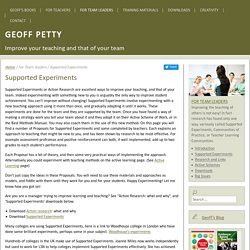
Indeed experimenting with something new to you is arguably the only way to improve student achievement. You can’t improve without changing! Supported Experiments involve experimenting with a new teaching approach using it more than once, and gradually adapting it until it works. These experiments are done for the team and they are supported by the team. Once you have found a way of making a strategy work you tell your team about it and they adopt it on their Active Scheme of Work, or in the Best Methods Manual. Each Proposal has a bit of theory, and then some very practical ways of implementing the approach.
Don’t just copy the ideas in these Proposals. Are you are a manager trying to improve learning and teaching? Many colleges are using Supported Experiments, here is a link to Woodhouse college in London who have done some brilliant experiments, perhaps some in your subject. Kurt Lewin: groups, experiential learning and action research. Contents: introduction · life · field theory · group dynamics · democracy and groups · t-groups, facilitation and experience · action research · conclusion · further reading and references · links. see, also : the groupwork pioneers series Kurt Lewin’s (1890-1947) work had a profound impact on social psychology and, more particularly for our purposes here, on our appreciation of experiential learning, group dynamics and action research.
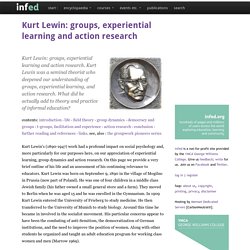
On this page we provide a very brief outline of his life and an assessment of his continuing relevance to educators. Kurt Lewin was born on September 9, 1890 in the village of Mogilno in Prussia (now part of Poland). He was one of four children in a middle class Jewish family (his father owned a small general store and a farm). They moved to Berlin when he was aged 15 and he was enrolled in the Gymnasium.
The University of Iowa remained Kurt Lewin’s base until 1944. Field theory Group dynamics Interdependence of fate. Task interdependence. Gordon W. Action research. Contents: introduction · origins · the decline and rediscovery of action research · conclusion · further reading · how to cite this article. see, also: research for practice.
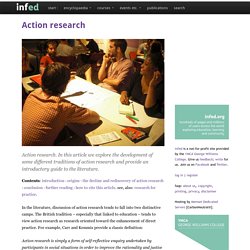
In the literature, discussion of action research tends to fall into two distinctive camps. The British tradition – especially that linked to education – tends to view action research as research oriented toward the enhancement of direct practice. An Introduction to Action Research. I feel that we need to make a greater effort to involve teachers in Action Research.
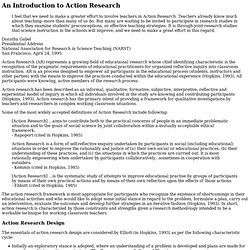
Teachers already know much about teaching--more than many of us do. But many are waiting to be invited to participate in research studies in which they examine students' preconceptions, or effective teaching strategies. It is through joint research studies that science instruction in the schools will improve, and we need to make a great effort in this regard. Dorothy Gabel Presidential Address National Association for Research in Science Teaching (NARST) San Francisco, April 24, 1995. Beginners' guide to action research. A beginner's guide to action research 1 This is a resource file which supports the regular public program "areol" (action research and evaluation on line) offered twice a year beginning in mid-February and mid-July.
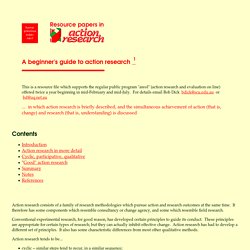
For details email Bob Dick bdick@scu.edu.au or bd@uq.net.au ... in which action research is briefly described, and the simultaneous achievement of action (that is, change) and research (that is, understanding) is discussed. Overview of Action Research Methodology. “If you want it done right, you may as well do it yourself.”
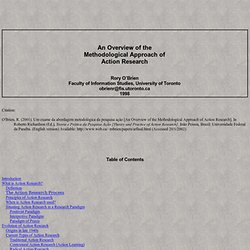
This aphorism may seem appropriate if you are a picky housekeeper, but more and more people are beginning to realize it can also apply to large corporations, community development projects, and even national governments. Tion Research in Education. Search RESINED Home.
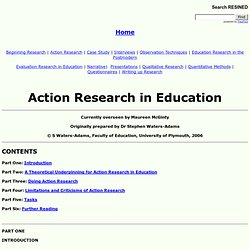
Tion research: a guide for associate lecturers. What Is Action Research? Evaluating and Improving our Practice: A Paradigm Shift. Everything we think we know is up for grabs..
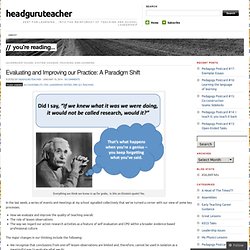
Is this an Einstein quote? No. In the last week, a series of events and meetings at my school signalled collectively that we’ve turned a corner with our view of some key processes. How we evaluate and improve the quality of teaching overall.The role of lesson observationsThe way we regard our action research activities as a feature of self-evaluation and CPD within a broader evidence-based professional culture The major changes in our thinking include the following: To some extent, these changes have been developing at KEGS for some time. Economics AS Lesson Study in action. As I outline in this post ‘How I do know how good my teachers are? Well, things are changing. Interestingly, during the week I had a tutorial session with one of my Y13 students, discussing Thomas Kuhn’s ideas about scientific revolutions and their relevance in the 21st century.
These are the events last week: Monday SLT meeting : We decided to abandon grading of lessons. Action Research Made Simple. Lawrence Stenhouse. Lawrence Stenhouse (29 March 1926-1982) was a British educational thinker who sought to promote an active role for teachers in educational research and curriculum development.
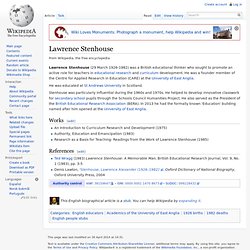
He was a founder member of the Centre for Applied Research in Education (CARE) at the University of East Anglia. He was educated at St Andrews University in Scotland. Stenhouse was particularly influential during the 1960s and 1970s. He helped to develop innovative classwork for secondary school pupils through the Schools Council Humanities Project.